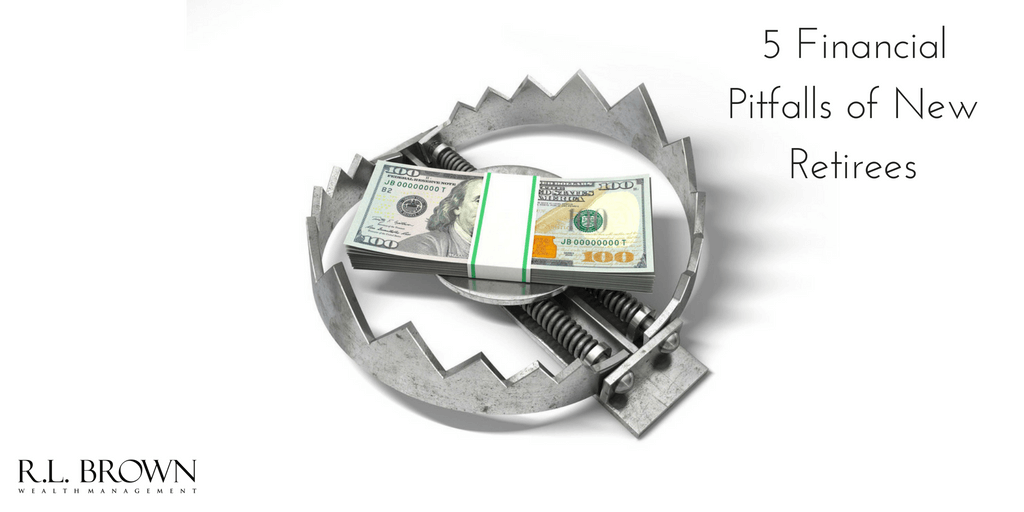Americans are saving far too little toward their retirement goals. In fact, 64 percent are now expected to retire with less than $10,000 in their retirement savings accounts.
Why are we not saving? For some, it’s the assumption they will continue working during retirement. For others, it’s the temptation to overspend during their working years.
Good news. It’s never too late to start making smarter money decisions that will improve your financial future. Let’s take a look at some of the common factors (and excuses) that are limiting your retirement savings efforts.
1) Letting intimidation prevent you from saving
The act of saving for retirement can seem overwhelming.
Numerous investment decisions. Choosing the correct contribution amount. Interpreting economic news.
All of these can leave you scratching your head. Don’t let your lack of knowledge paralyze your retirement savings progress. Start educating yourself via retirement planning articles and/or hiring a financial professional. Delaying your retirement savings by just a few years could mean the difference between retiring at age 60 vs age 75.
2) Covering your child’s debt
I don’t want to debate whether paying off debt for your child is right or wrong in a parental sense, but rather focus on the financial side. You may mean well but simply can not afford to financially cripple yourself in the process.
Remember your kids have a much longer time horizon than you do before retirement. Focus on your own financial goals for your golden years first before thinking about paying off the debts of a loved one.
3) Failing to save for specific lifestyle plans
Do you secretly have plans to retire early? Take exotic vacations? Buy a second home?
If so, you have to factor those things into your retirement savings strategy now! You must plan for those specific retirement goals instead of just assuming the money will be available.
Always remember – your retirement goals are unique and may result in you needing to save more than your peers or co-workers. You can’t just compare your savings strategy to theirs and assume you are on the right track.
4) Making emotional investment decisions
Do you let your financial preconceptions or biases influence your investing decisions? Chances are it happens without you even realizing it.
These beliefs can often prevent you from reaching your fullest financial potential. Here are some examples:
- You steer away from certain investments because of a fear of risk
- You invest in something to follow the crowd
- You often have a knee-jerk reaction (buy or sell stocks) to the latest stock market news.
Being aware of such habits is the first key to changing your ways and becoming less biased–and hopefully more profitable–as a result.
5) Being a slave to debt
Are you spending a significant amount of your income each month just to cover credit card or loan payments? If so, it’s probably preventing you from saving adequately for retirement.
Need help? Here’s a quick blueprint:
- Sell your “toys” or downsize until you are living within your means.
- Then focus on paying off your highest interest debts
- Work your way down the debt list until you’re debt-free, or only have low-interest debt remaining (think less than 5% interest rates)
- Start plowing that extra money into your retirement savings strategy
6) Not maximizing tax-deferred accounts
Tax-deferred accounts such as your 401(k), Roth 401(k), 403(b), Roth 403(b), 457, Simple IRA, SEP IRA, Traditional IRA, and/or Roth IRA, are the most important retirement savings vehicles available to you.
Why? These types of investment accounts allow you to contribute money toward your retirement savings without paying taxes on the income.
They continue to grow tax-free until you begin to withdraw funds (a couple of these are never taxed).
Better yet, when you finally do make withdrawals from these accounts, you’ll probably pay a lower tax rate on the distributions than you are paying now.
7) Dipping into your 401(k) or IRA before age 59 ½
Taking early distributions from your tax-deferred retirement accounts is something you should try to avoid at all costs.
Many people don’t think it’s a big deal to withdraw funds from their 401(k) or IRA in order to fund a business startup, pay off debt, or cover a mortgage down payment. But remember, these withdrawals are taxed as ordinary income and may be subject to a 10% federal tax penalty if taken prior to age 59 1/2.
The money you take out will also cost you in lost growth potential.
8) Neglecting your health
You may wonder what your health has to do with your finances. Well, neglecting to take care of yourself by engaging in such harmful habits as smoking or eating poorly could result in costly medical treatments.
It could also cause your life insurance rates to soar. On the other hand, focusing on good health habits could result in more available income to use toward meeting your retirement goals sooner. How does early retirement sound??
9) Launching a risky business venture
Perhaps you’ve always had a dream of starting your own company. While it’s a worthy goal, it’s also a territory upon which you’ll want to tread carefully. Taking the risk of borrowing a substantial amount from a bank or your 401(k) to fund your new venture could have a drastic impact on your retirement goal progress.
Furthermore, taking an outright withdrawal from your retirement savings accounts could lead to excessive taxes and penalties.
Before going this route, discuss an exit strategy with a financial professional to make sure you don’t lose both your new business and your retirement savings when it’s all said and done.
10) Relying on Social Security too heavily
Social Security has been a financial lifesaver for many past/current retirees, but that doesn’t mean future retirees will realize the same lucrative income benefits. In fact, the Social Security Administration predicts that the trust fund reserves will run out by the year 2037, if something doesn’t change.
What does that mean? You can likely expect a reduction in your projected Social Security income, or worse.
My suggestion – save as if Social Security will no longer be in existence by the time you reach retirement. That way, you will never be caught by surprise.
11) Not paying attention to your stock portfolio
If you leave your stock portfolio on autopilot for too long, you will most likely end up with an asset mix that is much different than what you signed up for.
This could mean owning a portfolio that is too risky for your stage in life or owning a portfolio that isn’t growing quickly enough to allow you to meet your retirement goals.
You must be diligent in monitoring your investment holdings, or you risk running out of money in retirement.
12) Switching careers too often
Changing career paths too frequently can definitely work against you. If you aren’t staying with a company long enough to earn retirement benefits, or you aren’t dedicating yourself enough to earn more through a promotion, you could be stunting the growth of your retirement portfolio. Give your best to your current career and reap the monetary rewards that may come with it.
13) Staying in a dead-end career
On the other hand, if you feel stagnant in your current career and it’s lacking in opportunities for you to grow and expand, then your finances could also be suffering as a result. A dead-end job could cause you to fall behind your salary earning potential and inhibit your ability to build adequate retirement savings. If you’re unhappy in your current career and you’ve given it a fair chance, break out of your comfort zone and explore other options, before it’s too late.
14) Not taking rising healthcare costs into consideration
With more and more individuals at retirement age, and living longer than ever, rising healthcare costs are practically a sure thing. This is why having a financial plan that factors in possible long-term care needs, is extremely important.
Without any backup funds to cover sustained medical issues (those that are not covered by health insurance), you will be forced to pull money out of your retirement accounts at a faster rate than you planned for. This could very quickly lead to trouble.
15) Failing to rollover your 401(k)
Don’t forget about your 401(k), 403(b), pension, or other employer retirement accounts when you change jobs.
You don’t technically have to move those accounts from our previous employer’s plan, but there are certainly some benefits to doing so. The biggest of which is gaining access to a larger and more robust selection of investment options.
If you neglect to roll those retirement savings into an IRA or Roth IRA with virtually unlimited investment options, you could be missing out on some major earning potential.
As with all things financial, take the time to research which option is best for you.
16) Not paying off student loan debt in a timely fashion
If you have a significant student loan payment each month, it could be hindering your ability to set aside sufficient funds for retirement. This is especially true if your loan has a high-interest rate. Evaluate your options for refinancing to a lower interest rate loan, and pour that extra money into your retirement savings. It’s a win-win.
17) Living above your means
Even if your salary increases over time, it doesn’t mean your expenses should increase at the same rate. The key to living below your means is constantly evaluating what is truly important to you. By keeping your spending in check, and contributing these salary increases to your retirement savings, you put yourself in a position to retire sooner and/or have a better retirement lifestyle.
As you near retirement age, avoid making any purchases that may put you deeper into debt. You are about to move to a fixed income that needs to last for 30, 40, or even 50 years. Having low debt will allow you to retire with a sense of peace.
18) Claiming Social Security Too Early
It’s true. You can start collecting Social Security benefits when you turn 62. You won’t receive the full benefit until you reach your full retirement age, however.
You risk “leaving money on the table” if you start your social security benefit too soon. How much? Your social security benefit amount increases by about 8% for every year you avoid taking it (starting at age 62, and ending at age 70).
19) Claiming Social Security Too Late
On the contrary, there are cases in which starting your social security benefit at age 62 is the best idea.
The great example is – early retirement. If you have saved well enough to be in a position to retire in your 50s or early 60s, chances are you are funding your retirement expenses solely from your investment portfolio.
If so, those distributions could be putting a lot of stress on your portfolio balances. Starting social security at age 62 would allow you to more quickly lower the amount of money you are taking from your investment portfolio, thus decreasing the likelihood of draining your retirement accounts.
In addition, if you are waiting to age 67 or 70 to take social security, but are stricken with health issues in the meantime, you may never recoup the money you lost by not starting your benefit at age 62. A long, healthy retirement is never promised, and taking your social security at 62 could help you enjoy your earlier retirement years a little more.
20) Not saving soon enough
The power of compounding is the most valuable tool you have when saving for retirement. But if you don’t take advantage of this concept by starting to save at a young age, it could seriously hinder your nest egg.
The “Rule of 72” is an example of how powerful compounding is. The Rule of 72 offers a useful shortcut since the equations related to compound interest are too complicated for most of us to do, without a calculator. Here’s an example of the rule in action:
You start with $10,000 at age 20. Based on the Rule of 72, and assuming your money is earning 8% per year, your money will grow to $20,000 by age 29, without having to add any additional funds.
It grows to $40,000 by age 38, $80,000 by age 47, $160,000 by age 56, and $320,000 by age 65.
Essentially, money with an 8% growth rate will approximately double every 9 years (and that’s with no new money added), based on the Rule of 72.
It’s easy to see how starting at a young age can really add up. Especially, if you continue to add additional savings over time.
21) Not budgeting for retirement contributions
This one is simple but important. When you create a monthly budget, don’t forget about retirement contributions. Neglecting to include them in your budget will quickly lead to overspending.
Tip: Instead of adding retirement savings to your budget as an afterthought, list it as the first item on your budget. Then complete the rest of the budget to figure out how to live on your remaining income.
22) Not taking advantage of an employer 401(k) match
If your employer offers retirement contribution matching, make sure to take full advantage of it as soon as you are eligible to receive the benefit.
It’s free money! Enough said.
23) Depending on your employer’s pension as a retirement income source
Retirement pensions are mostly a concept of the past.
The reason. They become very expensive to fund over time. For this reason, many well-known companies have chosen to freeze their pension contributions without notice. Employees that were depending on the growth of that pension are now left short of their retirement goals.
If your company still offers a pension plan, and you are below the age of 50, my advice is to approach it the same way we sometimes approach social security benefits – save as if it doesn’t exist.
24) Miscalculating retirement savings goals
Have you adequately calculated how much you’ll need to save for retirement? Or, are you basing your income savings on what your peers/co-workers are saving?
Furthermore, are you relying on the basic (and often inaccurate) retirement savings calculator on your 401(k) provider’s website? I can’t express how misleading those retirement calculators can be!
When you are calculating your retirement savings needs you must at least consider the following:
- The current and future rate of inflation
- The expected return on the investments you currently hold (not just the past performance)
- How your portfolio investment strategy is expected to change as you get closer and closer to retirement
- How your withdrawal strategy will affect your taxes
- Unexpected medical, long-term care, college, vacation and emergency expenses
- Social security income and taxation
Once again, these considerations just scratch the surface. You must be prepared to thoroughly research how to properly create your retirement projection, or hire a professional with knowledge to do so. If you waste time and build your savings strategy on inaccurate retirement projections, you won’t be able to get those lost savings years back.
The bottom line
Hopefully, this list has opened your eyes to the beliefs and actions that can destroy your retirement goals. As you know, you can’t turn back the clock…but getting your retirement savings strategy in order, as soon as possible, is the easiest (and least costly) way to plan for the retirement of your dreams.
If you’re already retired, all hope is not lost. Many of the tips mentioned above can help salvage your retirement goals. It’s never too late to try to get back on track.








Thank you very much Ron for this beautiful article. This is really amazing & interesting. I appreciate your thoughts & ideas. This will also helpful to others.